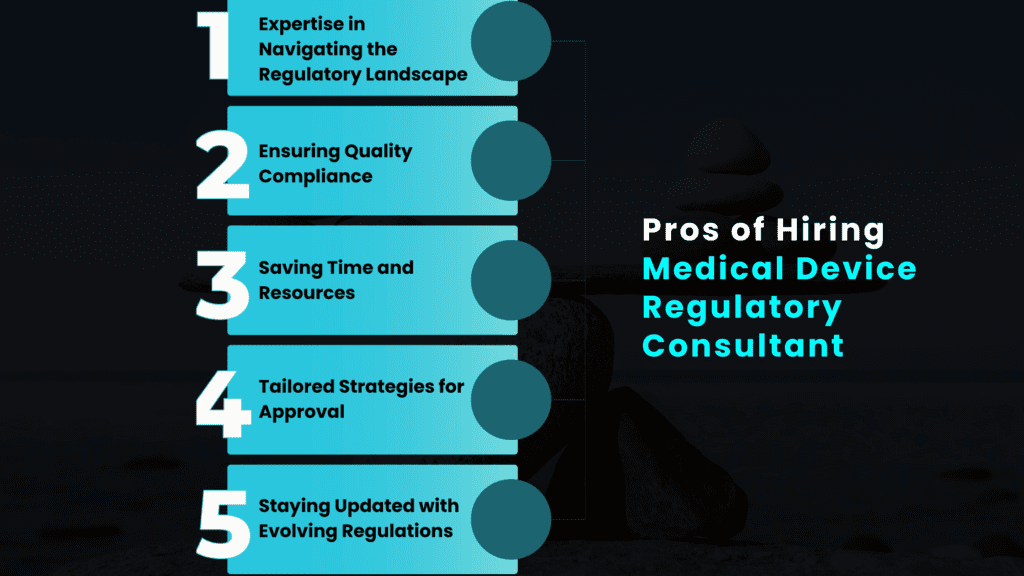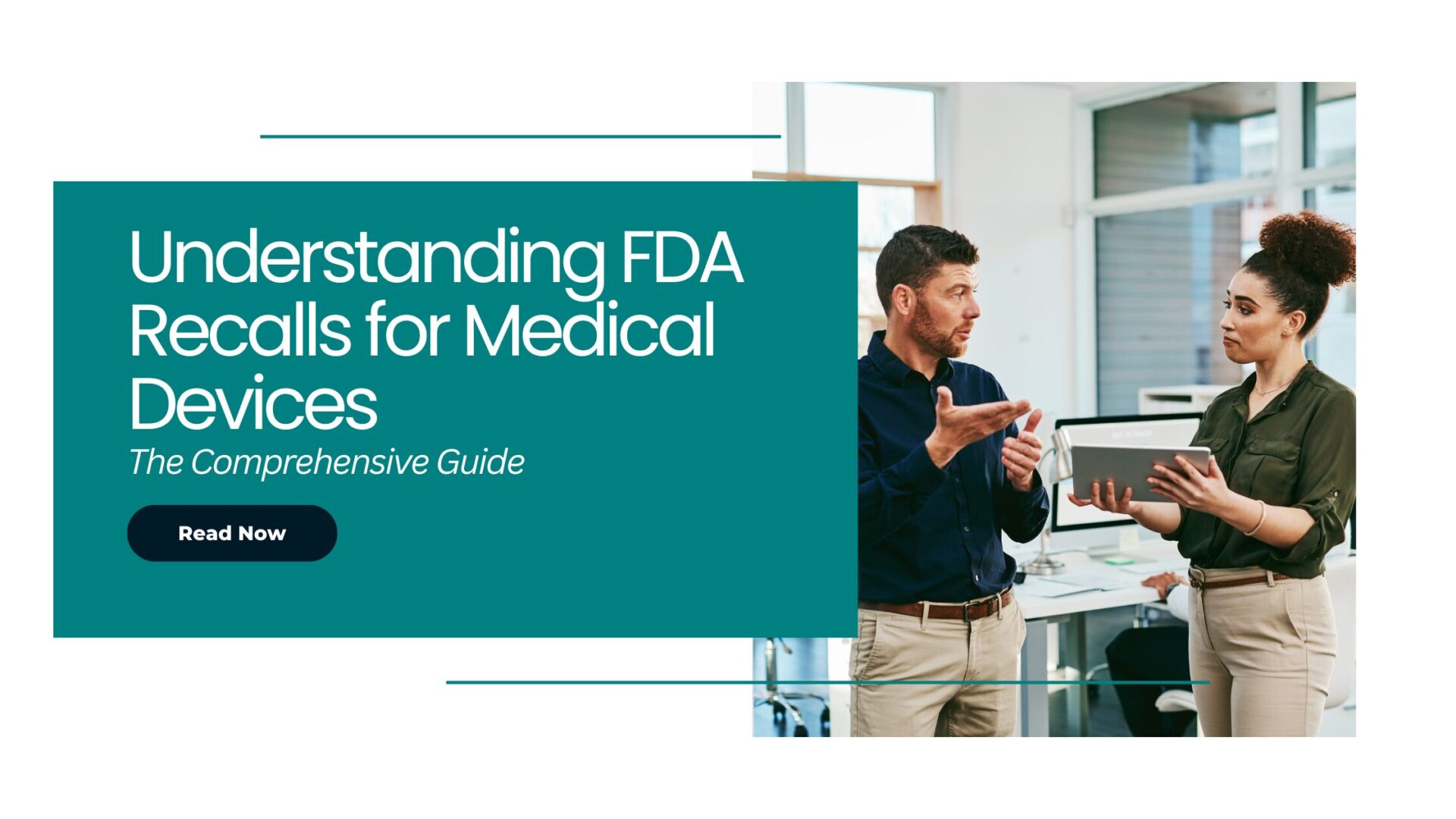Navigating the intricate framework of medical device regulations requires a delicate balance between expertise, compliance, and innovation. For mid-sized medical device companies, this challenge becomes particularly pronounced when aiming to introduce groundbreaking diagnostic tools or other kinds of medical devices to the market. While internal regulatory teams bring valuable insights, the evolving nature of regulations and the potential risks of missteps necessitate external guidance.
This is where the involvement of a consultant specializing in medical device regulatory affairs becomes significant.
These professionals offer their expertise to guide medical device manufacturers, companies, and stakeholders, as well as regulatory affairs (RA) and quality assurance (QA) in house teams through the detailed web of compliance. Nevertheless, similar to any choice, there exist both pros and cons to engaging their assistance.
A Medical Device Regulatory Consultant is a seasoned professional who possesses specialized knowledge and expertise in medical device regulations. These consultants play a pivotal role in assisting medical device manufacturers, developers, and distributors in ensuring compliance with the stringent regulatory requirements set forth by health authorities.
Operating in a dynamic and ever-evolving sector, these consultants provide invaluable guidance to ensure that medical devices meet safety, efficacy, and quality standards before they are placed on the market.
Regulatory consultants are well-versed in medical device regulations, such as the FDA regulations in the United States, the EU Medical Device Regulation (MDR), and various international standards. They stay updated on the latest changes and interpretations of these regulations
Consultants assist manufacturers in formulating comprehensive regulatory strategies tailored to the specific device and market. They evaluate the appropriate classification of the device, determine the required documentation, and plan the submission process considering every step along the way.
Consultants guide medical device companies in preparing essential documentation, including technical files, design dossiers, and pre-market submissions. They ensure that these documents are meticulously compiled, accurate, and aligned with regulatory requirements.
Consultants act as intermediaries between manufacturers and regulatory agencies. They facilitate communication, respond to inquiries, and address any concerns or deficiencies raised by the authorities during the review process.
Consultants guide through post-market surveillance and reporting obligations. They help monitor device performance, address adverse events, and make necessary adjustments to maintain compliance.
Regulatory consultants often provide training sessions and workshops to empower medical device manufacturers/developers with a deeper understanding of regulations, fostering internal expertise within organizations.
For medical devices intended for multiple markets, consultants facilitate market access strategies by interpreting different regulatory requirements in various regions. Consultants help reduce redundant work by leveraging documents prepared for one market for other submissions as well while addressing gaps along the way.

A medical device regulatory consultant is the GPS that helps you navigate through the regulatory jungle. They possess a comprehensive understanding of the regulations laid out by authorities. Their expertise allows them to provide you with a clear roadmap to compliance, helping you avoid potential pitfalls and detours that could lead to delays or product recalls.
A regulatory consultant ensures that every aspect of the medical device complies with quality and regulatory standards. They help establish processes that align with ISO standards, Good Manufacturing Practices (GMP), and other vital benchmarks, guaranteeing the safety and efficacy of your device.
One of our clients, a pioneering startup, utilized the expertise of Elexes to guide them in placing their implant in the EU market. With the Elexes’s adept navigation, we avoided potential delays and compliance pitfalls. This is because Elexes assisted the manufacturer in establishing a well-structured QMS as per EN ISO 13485:2016 and made sure the documentation was in line with EU MDR requirements including clinical, biocompatibility, shelf life, packaging, and sterilization validation data. Before going to Notified Body, Elexes facilitated an effective internal audit to ensure the manufacturer was ready for the Notified Body audit for the CE mark.
Time is of the essence, and medical device development involves complicated phases. Hiring a consultant is akin to hiring an experienced project manager. They streamline processes, avoiding redundant efforts and ensuring efficient resource allocation. This proves advantageous, especially for smaller enterprises that might lack a comprehensive regulatory workforce with a diverse skill set, knowledge, and experience in a plethora of areas, such as cybersecurity, software, analytical validation, performance testing, and others, depending on the device type.
Just as a doctor tailors treatment plans to individual patients, a regulatory consultant tailors strategies for regulatory approval based on device type and its technologies. They analyze the device, its intended use, and its unique attributes to craft a personalized pathway to compliance, enhancing the chances of a successful submission.
A regulatory strategy encompasses a comprehensive plan that a company devises to navigate the target regulations and ensure successful compliance for their medical device. It involves
This tailored strategy aims to streamline the regulatory submission process, reduce delays, and facilitate the device’s approval and market entry.
Consider a medical device company creating a novel wearable to monitor real-time patient vital signs for remote healthcare providers. Without a solid regulatory strategy, the company might struggle to navigate the appropriate regulatory pathway, delaying market entry. They could overlook essential safety standards and requirements relevant to accuracy, precision, user-friendly interface, interoperability, data security, etc., leading to redesigns and delays, and might mishandle clinical data collection, risking efficacy demonstration. In essence, a strong regulatory strategy is indispensable to smoothly navigate these complexities and bring the device to market effectively.
Regulations are like tides, constantly shifting. A regulatory consultant not only helps medical device innovators on the current regulations but also stays updated on impending changes. They act as sentinels, ensuring the device remains compliant in the face of evolving guidelines, saving the manufacturers from potential legal and financial repercussions.
One good example of regulatory change is – TGA’s medical device reforms. The Therapeutic Goods Administration (TGA) has made regulatory updates to enhance the safety and effectiveness of therapeutic products in Australia. The changes affect medical devices and pharmaceuticals. To comply with the latest TGA standards, manufacturers must stay informed in the evolving regulatory environment.

Hiring a medical device regulatory consultant comes at a cost like any premium service. While a high-quality raw material increases production costs, it pays off in the form of a superior end product. Similarly, while the upfront cost might seem daunting, the value a Consultant can add can ultimately outweigh the expense.
Communication between the manufacturer’s internal team and an external consultant could face challenges due to differing interpretations of medical device regulations. Addressing this requires active effort from both sides to bridge the communication gap. It is wise to choose a Consulting Firm that has well-established communication systems and processes and is also audited and certified for these.
Depending solely on an external consultant has its own set of risks. If the consultant becomes unavailable or leaves abruptly, the manufacturer could face a knowledge vacuum. This highlights the importance of internal teams being well-versed in regulatory nuances.
Regulations provide a standard framework. However, innovation often requires pushing these boundaries. A consultant might err on the side of caution, potentially stifling innovation. Achieving the right balance between compliance and innovation requires a delicate dance.
A consultant’s credibility is paramount. It’s crucial to meticulously examine potential consultants, review their past performance, and seek references. This process parallels the due diligence one would exercise when choosing a healthcare provider.
Hiring consultants for your product compliance with regulations? If you’re looking for comprehensive guidance, don’t miss our detailed blog post: ‘A Complete Guide to Hiring a Medical Device Consultant.’ Gain insights into the crucial factors, expert tips, and success stories that can shape your journey toward regulatory success.
Just as a medical professional tailors treatment to a patient’s needs, you should assess if your organization’s specific needs align with the benefits a consultant offers. Larger medical device companies might have internal regulatory teams but could still benefit from external insights. On the other hand, smaller manufacturers could also find consultants very useful.
You must assess your internal regulatory capabilities. If you have a robust team well-versed in regulations, you might require less external assistance. Conversely, a smaller team could gain substantial support from a consultant. Also, for interim high-load situations, it may not be wise to hire additional staff, instead, a staff augmentation through a consultant would be a much better option.
Weigh the pros and cons of hiring consultants for your organization. Balance the potential for smoother compliance and quicker approvals against the financial costs and potential challenges.
Consider this example of how weighing benefits and drawbacks can help a medical device manufacturer hire a regulatory consultant. To interpret regulations for new product launches, a manufacturer might hire an external consultant. Benefits include expert guidance, knowledge of evolving regulations, and faster approval for swift market entry. However, added costs and information transfer challenges are also potential drawbacks. Weighing these factors can help the manufacturer to make an informed decision and align needs with the consultant’s expertise.
You must define your goals before engaging a consultant. Do you need assistance with FDA submissions, EU MDR compliance, or both? Clear objectives help in finding a consultant whose expertise aligns with your needs.
Much like calculating the ROI of a new medical equipment purchase, consider the ROI of hiring consultants. Will their guidance lead to quicker approvals, fewer recalls, or streamlined processes? If the benefits significantly outweigh the costs, the decision becomes clearer.
Looking for a consultant? Set out your path to regulatory excellence alongside Elexes! Our latest case study highlights how we partnered with a manufacturer to craft a winning strategy for their product launch. Witness firsthand how our expertise led to the attainment of a prestigious 510(k) clearance and a sought-after CE mark.
In the composite realm of medical device regulatory affairs and quality assurance, hiring a regulatory consultant can be both a strategic advantage and a potential challenge. Like skilled surgeons, they can delicately guide your organization through detailed procedures. However, like any medical intervention, careful consideration is essential. By comprehending the requirements of your organization, evaluating internal capacities, and conducting a thorough assessment of prospective consultants, you can arrive at an educated choice that harmonizes with your objectives.
If you’re seeking seamless success for your upcoming launch, let Elexes be your guiding light in the realm of regulatory consultancy.
Call us now, let’s discuss!






















